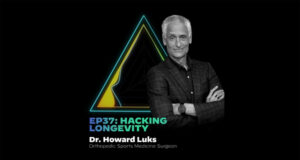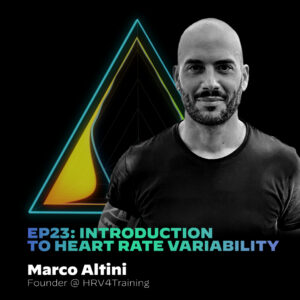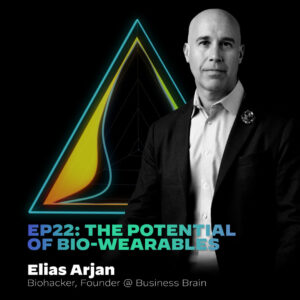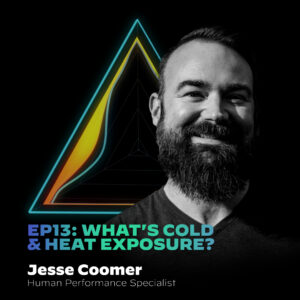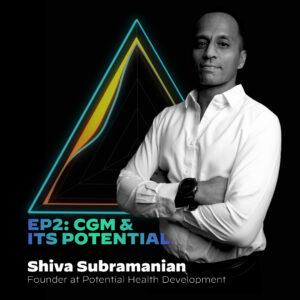Introduction Of Podcast
Fascinated by the concept of longevity and biohacking? Tune into this week’s episode where Lucas Aoun, founder of Ergogenic Health, breaks down the basics of modern biohacking and how to pursue biohacking for longevity with Mohit Kumar, founder & CEO, Ultrahuman!
Timestamps
- (00:00 – 01:41) – Introduction
- (02:12 – 3:27) – Lucas On Ergogenic Health
- (7:58 – 10:31) – Lucas On Longevity
- (14:09 – 16:27) – Lucas’s First Experience with a CGM
- (18:32 – 22:02) – Cheat Code to Longevity
- (25:13 – 33:11) – Experience with Ultrahuman Cyborg
Key Takeaways – Transcripts
Intro (Mohit): Biohacking, as well as the concept of do-it-yourself biology has been known as early as 1988. It is a term that was relevant between a few biology experts trying to hide their gene. It is 2022 now and over time, biohacking has evolved and for the good. It is now a cultural phenomenon and folks outside of medicine and biology are doing all types of cool things to discover more about themselves, to biohack their life and their way of living. But what exactly is modern biohacking? To understand this, we have with us our guest Lucas Aoun, a pharmacist turned biohacker, who discusses some of the most interesting ways folks like you and me can implement biohacking into our lifestyle. We delve further and talk about biohacking from a longevity perspective and how can one combine the cool and fun neutraceuticals with simple lifestyle changes and see life transform for the better. Obviously with careful and measured approach towards handling the neutraceuticals. So here we don’t want to talk about, we don’t promote any neutraceuticals. You can achieve whatever you want to achieve with lifestyle changes, but it’s always good to know what’s out there. Lucas is also keen to share his experience of the Ultrahuman Cyborg on the segment and suggests some of the cool hacks that he personally recommends to all of us. So let’s dive deep in.
(Mohit): Lucas, great to have you here, man.
(Lucas): Yeah, I’m excited to chat Mohit. I’ve got a lot to share and I’m really excited to be here today.
(Mohit): No, I really got intrigued when Abhilash actually mentioned and told me about that you run a company in the space, Ergogenic Health.
(Lucas): Yeah, only been running for a few years now, but I really enjoy just sharing unique and insightful health information.
Question (Mohit): Got it. Like, really excited to know more and to chat more about it. Also, basically, given that we have an overlap in the domain with Ultrahuman and Ergogenic is essentially sort of like working towards a similar goal, different approaches, would love to essentially talk about, let’s say, the approach in this space. What do you think about what’s happening and the pace of innovation, specifically around longevity? Would love to know a little bit more about the business that you’re running in so that I have a little bit more context.
Answer (Lucas): Yeah, sure. So I guess my business started out just with a pure interest and passion in improving human performance, whether that be on a soccer field or mentally. Whilst I was studying at university, I worked in my dad’s pharmacy, so I had the choice of becoming a pharmacist, but I actually ended up going down a different path. I’m a qualified Naturopath now, so I studied for four years full time. After completing my degree, I started my own business, Ergogenic Health, and I love to explore and express really cutting edge biohacks and some really cool health resources, which is why I think the whole space of CGM technology, health tech, I truly do believe it’s going to be a game changer in 2022.
Question (Mohit): That is really cool. And a few years back, let’s say just five years back, if you would say somebody is a biohacker, you would basically come across people who are talking about gene editing or it would seem Sci-Fi, but now it seems like it has almost become like a culture. It’s still very small, like only a few people actually get it, but it’s increasingly becoming a culture. A culture of people who actually believe that they can take the control of their own health in their own hands and without depending on the existing, we can say, inefficiencies of the healthcare system, they can actually create their own journey. So what’s your view on why that is happening? Why are people becoming more and more aware about their own health, becoming a biohacker? And what was your journey? Why did you actually become a biohacker in the first place?
Answer (Lucas): Well, I guess it actually stems from a lot of the reasons why so many people get into alternative health and natural medicine is because they’re frustrated with conventional medicine and Western medicine in a way that they’re sometimes treating patients, not really getting to the root cause of their disease or issues. So for me, I was really interested in, okay, I want to understand what’s happening, why is it happening, what’s the mechanism? And I think more and more people are becoming interested in understanding why. There are actually people are sick of accepting things just as being told by their doctor. They want to understand why things are occurring and understand the mechanism. So I think those that really get into like, biohacking and these gene editing and all these fancy health tech devices because they’re just wanting to gain more control over their body, have more autonomy over their body, and with that self-awareness, they can do so much more. They can achieve so much more by understanding their body a lot better.
Question (Mohit): Yeah, no, I think that wave has certainly started and people are really rising up to the opportunity of like, for the last few years and few decades, if it has been harder and harder to get to your health outcomes, the type of life that you want to live, probably healthcare is the only industry where it has become murkier over time. It’s not become clearer over time that this is how you achieve or get to a better state of health. The costs are increasing, the accessibility is still low. And as you rightly mentioned, a lot of what Western medicine today is built around. And I particularly remember the founder of Viome, it’s a microbiome company, talking about this, that we built the Western medicine on principles of sterile. So essentially anything that is sterile is safe. And this was obviously a great thing back then because most of the diseases that were fatal were actually, you can say viral or bacterial diseases. I mean, disease of the microbes. Microbes were looked as upon being something that is bad and if you’re sterile, you’re essentially safe. So whatever we built, we built it in context of that. Here’s how you actually get rid of everything and then start afresh, get rid of all of your bacteriums and essentially your virus system and essentially this is how you survive. But if you just look at that one dimension now we know that we are less than 1% of our parents’ DNA and we are essentially 99% microbiome. And that is quite radical because a few years back, just maybe ten years back, if you said this, people would consider somebody as crazy and say that like, oh, my genes are from my parents and if they have some problems, I would probably have them as well. But now we know that microbiome also determines a large part of who you end up being. So this understanding of nature, alternative medicine and what our body truly comprises of is fairly new. I would also say that it’s dopamine generating to some extent. Like what you were saying right now was really interesting. It’s like in Renaissance, if you would notice, right, science and science and technology really boomed right along with art. So I think the renaissance in medicine or in healthcare is coming where the most valuable people will be thinkers in the field of science and art. But yeah, I think on that note you spoke about CGMs as well. So within this community you can see a smaller group of people who actually believe that they can actually live longer, right? And they also think that ageing is a disease and not really something that they have to go. So what’s your view on that? Sometimes it’s looked upon as being a very negative view on life, saying that oh, I don’t want to live for 100-200 years, I just want to survive till 60 and I’m done and live a great life. But then there’s a different set of people who actually say that I’m going to live as much as I can in a healthy way and that’s what longevity means for me. So what’s your view on that?
Answer (Lucas): It’s a really good question, Mohit, because when it comes to longevity, we have to look at the actual definition itself and also in context of the other word, which is health span. So if we look at longevity is just simply how long a person lives from birth until death, whereas health span accompanies the number of years spent in good health, which is in my opinion, more important. Like we want to live, but we want to be vital and have good vitality and good health. As far as whether or not we can influence longevity, I mean, I am someone who truly do believe that we can influence the genetic expression of various pathways within the body. And just as you mentioned before with the microbiota, with various gut bacteria. We know that these have such broad reaching effects on changing the gene expression of inflammation pathways, affecting tumor development, suppressing tumor development, altering insulin sensitivity, altering liver function. So we know that these things can be altered through diet supplements, stress management, yoga, exercise. All of these things are multi-factorial. And what we need to hopefully now people are starting to realize that there are so many different ways that we can influence the rates of ageing. And that is what I think is really exciting about using something like the CGM because that data is so precious and so important because it’s so individualized. And that’s where I think we’re going to see more and more people. Just like with the ordering, everyone was tracking their sleep. I truly do think that the CGM is the way of the future.
(Mohit): Right. No, I truly believe so as well. Especially the data that we get on glucose variability. And in fact, the first few weeks when you put on a CGM, it’s almost always a surprise that what we consider as healthy in most cases sometimes turns out to be something that is a shocker because it is keeping your glucose above inflammatory level, but it’s marketed as healthy. The problem really is that people are really confused between micronutrients and micronutrients in many cases. It’s like, for example, in India there’s a culture of millets and we definitely consider millets to be healthier than most of the grains. But if you consume millets above a certain threshold, it’s also not going to be healthier for the body. Because nature optimizes for balance. It doesn’t really care about whether if you’re having lesser than what you need or more than what you need, it’s still bad. But if you’re having it within the range, it’s pretty okay. So that is the understanding that or the homeostatic understanding that the CGM creates that more is bad, less is also bad, somewhere in the middle is good. And this balance is something that we feel is really powerful because look, to be honest, there are not many studies that have been done with the CGM in healthy people, right? And a lot of practitioners in this space would outright dismiss that CGMs are only for diabetics. So why are healthy people using it? It’s almost like saying that unless you have diabetes, you can’t really understand your body. It’s very restrictive.
(Lucas): Spot on there, because that aspect there is like they’re just completely neglecting the preventative side of things, like the prophylactic aspect of maintaining good health. I totally agree.
Question (Mohit): In fact, I can share one example that we were looking at different clinical trials in this space, thinking about is there a way to do our own as well? And the most interesting part was that you could do a clinical trial for preventive people. But how do you validate a clinical trial for preventive health? In fact, it’s really hard because most of the validation metrics or markers are actually clinical markers. These clinical markers are actually designed for not the preventive use case, but for the diseased use case. Whether you look at, let’s say, that pressure as a biomarker or resting heart rate as a biomarker, even glucose as a biomarker, anything, any of these sorts, right? These are all defined for people who have a condition. And then those people, how can you actually create impact? But when you do a preventive study, for example, if your HbA1C in glucose, for example, moves from 4.9 to 4.5, this is still directly the right movement. But there have not been many studies or actually, you can almost say that probably you can count them on your fingers, that not many healthy people have been studied in this aspect, that whether the movement from 4.9 to 4.5 makes a difference. But what we see in practice is that a lot of people, when they move from 4.9 to 4.5, you can say simple, sustainable lifestyle habits will prevent them from actually moving from 4.9 to 5.7 crossing the barrier of the diabetic threshold, right? So I think the medical industry today is ignoring the power of these lifestyle changes, that if somebody understands how to control their HbA1C, that is, on their glucose levels, that is actually quite powerful, and the CGM can teach you that. So I think that’s really probably one of the things that we’ve been seeing, that the concept of behavior change and behavioral medicine is actually sort of missing today in what we see. But what are the other trends that you’re seeing, Lucas, here? And tell us a little bit about some of the bleeding edge ones as well, the fun ones, basically something that people can really think about.
Answer (Lucas): Well, I guess let’s just start with, I guess, the first experience of wearing a CGM. My first experience in terms of how it changed my perspective of food and how powerful some of those insights were, which I really think a lot of people, again, as you mentioned at the start, using something like millet over-consuming that just like any other grain would be problematic. And so we can see that data first hand. And that’s what I saw with some of my experiments that I ran. Of course, when I put on the device, I’m like, all right, I’ve got two weeks to basically run as many experiments on my body as possible, to learn as much as possible, because I think that sort of learning is precious, because then you can actively make decisions based on not subjective response, but objective data, which is what I love. And then basically just bridging and understanding different foods, specifically how they affect cognition. And then also taking note of how I would feel if I was to enter into a hypoglycemic state. What were the symptoms that I noticed? What were some of the effects that I felt versus how did I feel when I spiked all the way up to 160 after, let’s say having one of my experiments that I did was I had pure cane sugar juice just for fun. I would never do that. But I literally just went to the market, got some cane sugar juice, had a whole thing of that and saw it spike up. I can’t say it felt distinctively different even though I hit 160. Like I didn’t actually feel any different, but it was actually on the rebound when it dropped down that I was getting the craving two to 3 hours later to introduce some sort of sugary food. So that was really fascinating.
Question (Mohit): I think, incidentally, I did the oral glucose test yesterday with a group of twelve people. All of us drank 100 grams of glucose. That is actually more terrible than it actually sounds. And in accentuated way, people realized like how nauseatic they felt after drinking so much of glucose and on the rise. And then of course, after the fall, they felt like extremely lethargic, sleepy. So what we did was we went to our Sports Performance Center where we actually train with athletes, or train athletes as well. We drank 100 grams of glucose. And on the way back, our office is almost an hour away from the Sports Performance Center. And essentially most of these folks start saying like, oh, I’m feeling extremely sleepy, I feel like crashing. So that’s like an accentuated effect of what sugar can do on your body or glucose can do on your body. I think the ability to understand that is really important because once you know the feeling and you know that it does harm to you even if you don’t have the CGM, sometimes you’ll have the instinct to say that I need to take a walk after a high carb meal because it is going to get my glucose in an inflammatory zone. I should eat early because if I get a late night spike, it will affect my sleep. Or probably I should add more fibers because if my fruit that I’m eating has less fibers in general, because modified genetically, and it’s not the original fruit that was there like 50 years back or 80 years back. So how can you add more fibers and balance it out with your activity? Or become more insulin sensitive overall? Essentially do strength training. So those are the things that I think the outcomes are very simple. Most of the answers around health are not in a pill. Extremely simple, right? You get enough good quality of light, you manage your timing, like eat within the food window, manage your stress, sleep, that’s all right? But I think the ability to create that awareness, it’s very hard to breach unless you show people that oh, this is exactly what’s wrong in lifestyle today, based on data. But I think what happens really is that and I’m not saying that I’m not one of them, but it’s really easy to sometimes also consider a pharmacological way as an answer. And you say that, oh, there’s more research around Rapamycin or Resveratrol Why don’t I give it short? What’s your view on that? And I personally feel it’s a really impressive domain because it’s in the search of that molecule. But I would love to hear your thoughts as well. What’s the cheat code to longevity?
Answer (Lucas): I’m super passionate about longevity drugs, longevity supplements, things like Medformin, Rapamycin Spermidine, which is up and coming Resveratrol, Nicotinamide, Mononucleotide. I absolutely love looking into the research and also experimenting as well. I’m someone who manages to get my hands on all sorts of anti-aging compounds. As far as integrating them into someone’s routine and lifestyle, my stance is that they are just the icing on the cake. Basically, I think the real focus should be on establishing the pillars, which, as you mentioned, getting sufficient sleep, because we know that even one night of single sleep deprivation will lead to insulin resistance the next day. And that’s well documented. So how can you prioritize a supplement over getting good quality sleep? Realistically, the body doesn’t like that. So optimizing sleep, altering nutrition, incorporating sufficient fiber, dietary, healthy fats, things that stabilize blood sugar levels, I think these need to be considered as part as in conjunction with these anti-aging compounds. I think when you merge both, you get the best of both worlds because we do have strong evidence to suggest that Medformin truly is an anti-aging drug in type two diabetics that will keep them alive for longer in type two diabetics. So I guess in this situation I like to merge both. I mean, I’m someone who’s all about improving quality of life, improving vitality and performance. I think there’s a time and place for both, for sure.
Question (Mohit): And what about stuff like additional therapies, like Hyperbaric oxygen and cryo? How do you feel about those?
Yes, I’m also a heavy experimenter and
Answer (Lucas): a big fan of like, Sauna therapy. I mean, I’ve got my own infrared Sauna here at home. Personally, I don’t use it as often as most people would think, but if I was 45 and above and I was limited, I couldn’t do much exercise and I would use the Sauna three to four times a week in replacement of exercise. I’m just someone who prefers to do a lot of exercise because I love it. But if I didn’t have a choice to exercise, I would definitely use the Sauna and combine that with cold showers. I mean, we know that ice baths, cold showers, all of these things are known to stimulate the production of brown adipose tissue. Brown fat, which we now have tons of research that suggests that brown fat can act as a pro metabolic adaptation. It actually helps the body in the long run, improve its metabolic control and overall functioning.
(Mohit): I think for the listeners, brown fat is essentially fat with rich mitochondria. So I think there’s something called beige fat as well. It’s like not so rich, but it’s somewhere there in the middle. That’s really interesting. Actually, a few years back when I was reading the literature on the space, a lot of this was not there. Like, in terms of what does brown and beige fat mean? And how do different native populations in cold countries actually make use of the brown fat to actually survive longer, have better cold tolerance, and at the same time have much better control over their ability to metabolize the fat? So a lot of these things actually, while they seem to be true for everybody, like the global medicine standards, but there are so many genetic variabilities. Like, I came across a population or a set of people in a region in India, for example, a few days back, where their blood glucose levels are like above 130 and 140 mg/dl usually. And they’re perfectly healthy. It’s just because how they’re built, the variability is off the roof. Their average glucose is above 130. In traditional definition, they would be called pre-diabetics. But then the way the body consumes glucose and the way the brain consumes glucose is probably very different from how we consume. So even though we have one species, it seems like the way our gut functions, the way our genetics are everything that determines how we essentially interact with our environment. But yeah, I think what you also mentioned, the right ways to mix lifestyle and these longevity molecules, that’s the best intersection because the pillar and the foundation is getting good sleep, getting enough good quality, light, temperature exposure, exercise, good food. But then on this basis, if you can actually add all these longevity molecules, you can also hit the last mile as well, sometimes confuse the last mile as being the foundation and the foundation being almost not there. The one being easier essentially becomes the foundation for most people. The first time I think David Sinclair came out with the longevity podcast, I was getting so many texts from people in India saying that, hey, where do I get Rapamycin? And can I combine it with Medformin and essentially live longer? And I was like, have you actually started exercising first or getting good quality sleep? How much do you sleep? And most of the people are asking that. I get like five to six hours, and that’s what I get. The most immediate longevity drug for you is to actually get 8 hours or more and not Rapamycin. And it doesn’t sound intuitive to a lot of people because they’re definitely about the easiest, most you can say. It’s a great thing to get into. It seems amazing, right? Associated with the new age longevity molecule. Sleep is not interesting. It’s boring.
(Lucas): It’s too simple. Maybe people think they overlook the simple things. Sometimes the simple things are really what move the needle.
Question (Mohit): Yeah, no, I think that is true. Moving on to you’ve also used the Ultrahuman Cyborg yourself. What’s your experience been like and what were some of your learnings essentially on the platform?
Answer (Lucas): Yeah, I mean, my experience with the Cyborg application
and the overall experience in general was amazing. I mean, I’m someone who has used the freestyle, just a regular application. In general, my experience was really positive. I really liked how the data was presented. And also for me, it just made so much logical sense that I could simply scroll at the top, change the date and clearly see trends. It was very easy to identify trends. I think the most important feature that I got out of it was the ability to input your meal. So you can literally see, you can tap on the meal and you can clearly see, you can scroll back and see how many minutes later after that meal did your blood sugar levels peak. But then in addition, I really like how the Cyborg experience is focused on the reminders and the alerts that the user gets from the actual application. So those little triggers, I think, are really powerful to instill behavioral change, even after stopping a CGM device because it’s giving you those key alerts, those reminders, which for me, I think it completely changed my perspective of food. And that’s what we need to happen with majority of people who are suffering from obesity or diabetes, things like that. They need to have a different relationship with food and they need to actually see some data, maybe to give them a bit of a shock or I guess just maybe scare them in a sense. Sometimes it comes down to witnessing your own scores.
Question (Mohit): Yeah, no, I think that’s a good way to say it. Sometimes you need to be scared to action and action for the good. This is your body telling you or giving you a signal that we need to act and we need to figure out a way to do something else because existing approach isn’t working. So that’s really interesting. And what were the unique things? Like, for example, did you end up using the metabolic score as well on the platform?
Answer (Lucas): I was aware of that score. That daily score. For me it was quite high. Majority of the time was like above 90 most of the time, which was positive. I mean, my dad’s type two diabetics, so it’s always handy to see that. But I think the estimated HbA1C one here was also really useful because I’m not exactly sure how that’s calculated, but that insight was really useful as well.
(Mohit): It’s an average of glucose points. It’s not the actual HbA1C, it’s an estimated one. So it’s an interval average of the glucose coin. So that’s why it’s an estimate. I think what you just mentioned is fair that for people who are constantly getting extremely high scores, the challenge for them is to maintain high scores for a long time, but I think most of the population, like, if I talk about the Ultrahuman Cyborg platform today, an average score on the platform is 72. And that really talks about the problem that we’re facing. By the way we qualify our user list, essentially, or people who sign up for people who don’t have a metabolic condition. And even then, we actually land at a number, which is 72, which is on the lower side or at a very high risk. So you can imagine what sort of high risk population exists globally. It’s just sort of like a bottomless pit in terms of how people are unaware of their food environment and the type of ingredients that go into their food and how they can actually use lifestyle to make changes in their own body, right?
That’s really cool. And I think what also appealed to me while you were speaking, essentially, is the fact that if we show people data whether it’s in the form of fear, it’s not fear for the wrong reasons, it’s the right type of fear. Sometimes the right type of fear is what drives changing your own body. So I’m going to use that somewhere that people need to be afraid sometimes. It’s not all positive. You have to know when things are wrong to get the right. So that’s really cool. You managed to get a score of 92, which is really amazing on an average. One of the things that actually kept your score up, because I’m sure that you’re living an amazingly healthy lifestyle, but what are some of the things that actually worked in your favor to keep the score above 90 and so that people can benefit?
Answer (Lucas): By far the most impactful intervention was actually my treadmill desk. I’ve got a walking treadmill desk set up here at home and after any meals I had above 50 grams of carbohydrates, I would always just go back on the treadmill and literally just do like 20 minutes at 5 km/hour or even less 4.5. It was so fun to then quickly scan my device because I was like, there is no spike. Where is the spike? It never arrived. It’s like, did I even eat any sugar? It’s like, not according to this, no. So for me, show me a drug that can do that. Medformin can help, but not to that level, not to that degree. For me, that was a game changer.
Question (Mohit): Wow, that’s amazing. It’s almost like sugar in, sugar out. Your muscles actually act as a sponge for glucose. But I think that’s a great hack to have a treadmill work desk and it’ll be really fascinating to consume the food that you like, maintain macros and essentially see having sort of no impact. I would say that that’s a really good hack for a lot of people. What are the other ways? Like, maybe the top three. So this is the number one for sure. Next two maybe.
Answer (Lucas): Sure. So other things I did. Number two was actually the sequence of the macronutrients that I consumed. So instead of starting a meal with, let’s say, dips, maybe some bread and some dips, I would always start the meal with protein, like the protein portion first, like either the steak, the burger, the chicken breast, chicken thigh, whatever, the protein first. What I noticed with that was it blunted the glucose. Even if I didn’t walk after the meal, it would actually delay the glucose spike. And this would probably be due to the effect of some of these insulinogenic amino acids that are present in these protein rich foods which stimulate insulin release. It would be amazing if I think maybe in the future of CGMs would be the ability to see insulin as well. I don’t know where that sort of technology is at, but that would be very interesting as well.
Question (Mohit): That will change the game. What we’re really trying to measure, even today is insulin in response, and glucose is a proxy. So insulin would really be a game changer. Okay, I got the number two. What’s the third one?
Answer (Lucas): Number three for me would be adding in some sort of fiber to the meal as well. I noticed if I had a bowl of rice by itself, which I never usually do, but if I had a bowl of rice or something like that, I’d add in some sort of fiber, some sort of vegetable, maybe some peas or carrots, and that would delay that would also delay the glucose spike as well.
(Mohit): Got it. It’s amazing for your gut as well. Your gut loves the fiber, especially soluble ones. So I think these are, I think, really, you can say, easier to get into lifestyle changes for most people without compromising on the way they want to live their life. And I think if people just do these three things or maybe just like five simple changes in their life, small ones, they can probably delay the onset of any metabolic disorders, avoid them for the next maybe a few decades to come. And also, I think liver, as you mentioned at the beginning of the podcast, that not just lifespan also helps span, right. How do you live healthy life? And if your lifespan is balanced with a health span, that’s probably the best quality of life that you can live. But yeah, Lucas, it’s actually been a pleasure speaking with you here. Really appreciate your time. I really look forward to getting you here, I mean, meeting you here in India. Whenever you’re here, just let us know. We can take you to our office, where we also have a biohacking set up, anything that you can imagine. And in the future, of course, we will be developing more and more bio-wearables and markers. So we would love to get your opinion and perspective on each of these. But great speaking to you. I wish all the best with the journey as well. And stay safe. Yeah.
(Lucas): Thanks for having me Mohit and super excited to see what the future holds for Cyborg and Ultrahuman.
(Mohit): Thank you, Lucas.
Outro (Mohit): Biohacking is cool and complicated at the same time, but if applied wisely and smartly enough, the results can be positive and sometimes also transformative enough. For most people, biohacking is not just about results. Like for people who are into biohacking, it’s also about dopamine generating activity. It’s fun, right? That’s why it’s dopamine generating. So probably that’s one way in which you can look at biohacking as well. If you just look at the outcomes, you’ll probably not have as much fun. But if you enjoy the process, discovering something new about your body or like affecting your body, changing your body and seeing how it responds, then biohacking is for you and you’ll probably have a lot of fun with biohacking. So tell us, what are some of the biohacking trends that you have been noticing around? We would love to hear from you. Tag us @ultramanhq on Twitter and Instagram. Look forward to having a conversation with you also. As always, please subscribe to our podcast and share with you near and dear ones, especially the ones who want to know more about biohacking. We’ll see you soon with the next episode.




